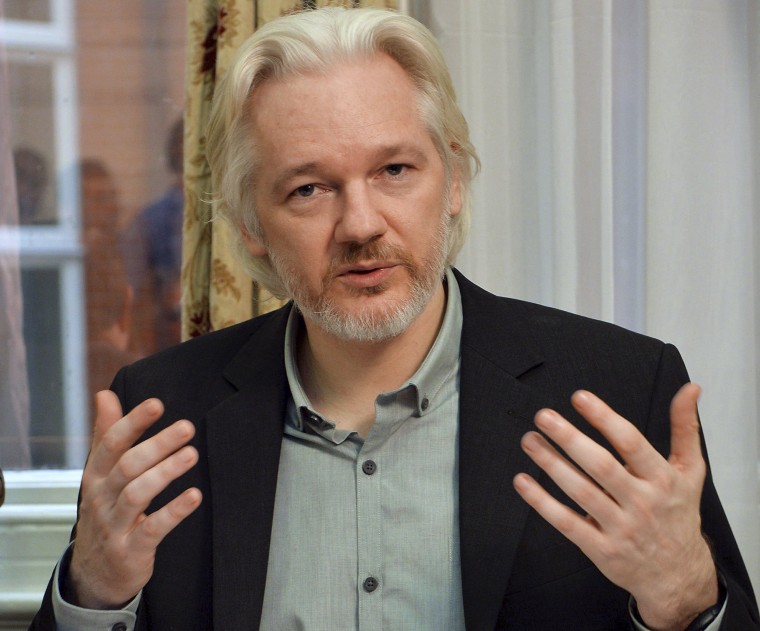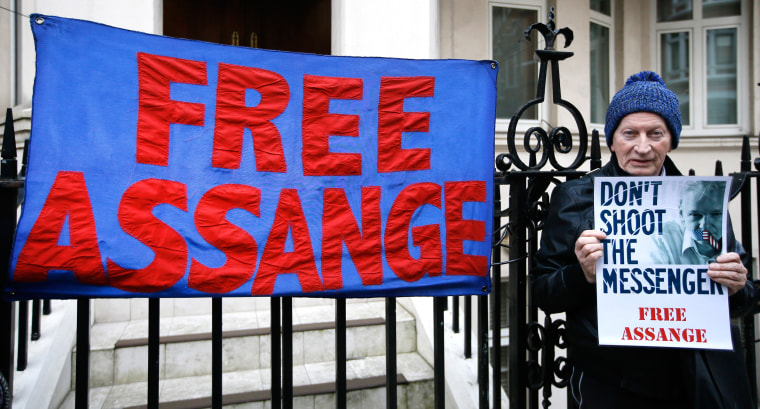LONDON — A United Nations panel ruled Friday that Julian Assange was being "arbitrarily detained" and urging an end to what it called the "deprivation of liberty" of the WikiLeaks founder.
Assange welcomed the decision, saying he considered the outcome "a vindication" and "a matter of settled law."
"This is a victory that cannot be denied. It is a vicotry of historical importance," Assange said.
However, Britain — where Assange has been holed up for more than three years — dismissed the ruling, saying it "changes nothing" and that Assange is "voluntarily avoiding lawful arrest."
The 44-year-old sought refuge at London's Ecuadorian embassy in June 2012 to avoid extradition to Sweden, where he is wanted for questioning on a rape allegation.
The Australian said he feared the Swedish case would be used to extradite him to the United States to face trial over his whistle-blowing website.

Friday's ruling, by the U.N.'s Working Group on Arbitrary Detention (UNWGAD), does not compel any government to act. However, it is based on international human rights law and is considered authoritative by the European Court of Human Rights, the panel said.
"The detention should be brought to an end and Mr. Assange should be afforded the right to compensation," the panel said, calling his situation a "deprivation of liberty" and saying he had been "arbitrarily detained."
The UNWGAD said it was responding to an application filed in September 2014, without naming who submitted the request.
The ruling was not unanimous. One of the members of the five-person working group "disagreed with the position" of the panel and said Assange's situation "is not one of detention." Another recused herself on grounds she shared Assange's Australian nationality.

Swedish authorities began investigating Assange in 2010 on allegations of sexual assault and rape against two women. The sexual assault allegation was dropped after time ran out to bring charges last year, but officials said they would pursue the rape investigation.
The panel said that Assange had been "subjected to different forms of deprivation of liberty" since 2010. Before taking refuge in the embassy, he was held for 10 days in isolation in London's Wandsworth Prison and detained under house arrest for 550 days.
The detention was also arbitrary, according to the working group, because of "the lack of diligence" by Swedish officials.
Assange reacted to the findings via Skype at a press conference at London's Frontline club.
"I consider the outcome in this case to be a vindication," he said, adding he saw the ruling as "a matter of settled law."
He added: "It is the end of the road for the legal arguments that have been presented to date by Sweden and the U.K. To put simply: Those arguments lost."
Later, in a press conference outside the Ecuador Embassy in London, Assange said Sweden and the U.K. did not appeal the decision "because they knew they would lose."
"There are no grounds for appeal because the law is well-established and documented in this comprehensive binding judgment by the working group on arbitrary detention," he said.
Before the decision was released to the public, Assange said he expected the return of his passport and the "termination of further attempts to arrest" were the panel to find in his favor. It was not clear if he had seen the decision beforehand.
However, Britain's Foreign Office quickly rejected Friday's ruling and said it planned to continue to seek Assange's arrest under a European Arrest Warrant.
"This changes nothing. We completely reject any claim that Julian Assange is a victim of arbitrary detention," it said in a statement. "The U.K. has already made clear to the U.N. that we will formally contest the working group’s opinion."
It said the ruling "ignores the facts and the well-recognized protections of the British legal system," adding that Assange was "in fact, voluntarily avoiding lawful arrest."
It added that Britain was "deeply frustrated that this unacceptable situation is still being allowed to continue."
Until October, British police officers were stationed outside the Ecuadorean embassy around the clock. Between June 2012 and October 2014, the Metropolitan Police had spent around $14.5 million on the operation, according to official figures.
